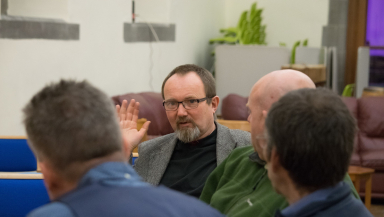
With the British Medical Association recently reporting that mental health services are not being resourced at a fast enough rate to respond to the level of demand, Reverend Canon Kerry Dixon, a Mission Development Officer in Scotland for Church Army, has transformed his traditional Episcopal church in Dundee into a lifeline for those suffering with poor mental health issues, helping them to avoid or overcome a resulting addiction.
Based in Dundee, a city facing Europe's highest rates of social housing and drug-related deaths per capita, Kerry has worked tirelessly to develop the Pirate Monks and Pirate Nuns support groups, providing care and guidance to those with mental health issues where overstretched public services fall short, in an effort to intervene before their mental health deteriorates into addiction and/or homelessness.
The cycle of mental health and depression is not new to Kerry; with 35 years of experience, he has seen first-hand how poor mental health can lead to addiction, with service users often turning to alcohol, drugs or other risky behaviours to self-medicate away the feelings of sadness and perceived failure.
This issue is often made worse by the vicious cycle that is played out over and over again in Dundee, as well as many other parts of the UK, where public services won't step in until the person is sober, yet they feel they can't achieve sobriety until their underlying mental health issues have been addressed. However, with Kerry's guidance, the results of the two support groups has been exceptional, with many using the tailored care and guidance to turn away from their addiction towards functioning lives.
What is remarkable about Pirate Monks and Pirate Nuns is that Kerry has created a space that is accessible to everyone, irrespective of religious background. While Christianity is the main driver for the groups, what is built in Dundee is a focus on hospitality and building genuine connections between the attendees to help them navigate their mental health challenges.
Kerry commented: "The support that Pirate Monks and Pirate Nuns provides is both emotional and practical. My objective is to build an environment where attendees can feel safe and secure, but also heard and understood. While the group is built on Christianity, we support all faiths, and we support each other; building lasting friendships and connections.
"Practically, I provide essential items like clothing and access to foodbanks, but also help out by supporting them through the process of getting a permanent place to live via the council. And when they are moved into accommodation, I help out with DIY – recently I was laying carpets and fitting a shower for one of our group.
"Building the trust of the people who rely on the two groups is vital, and to build that trust I have not only taken them away on weekend retreat, but also engaged in symbolic gestures like a foot-washing ceremony on Maundy Thursday."
You can find out more about Pirate Monks on Church Army's website at this link.













